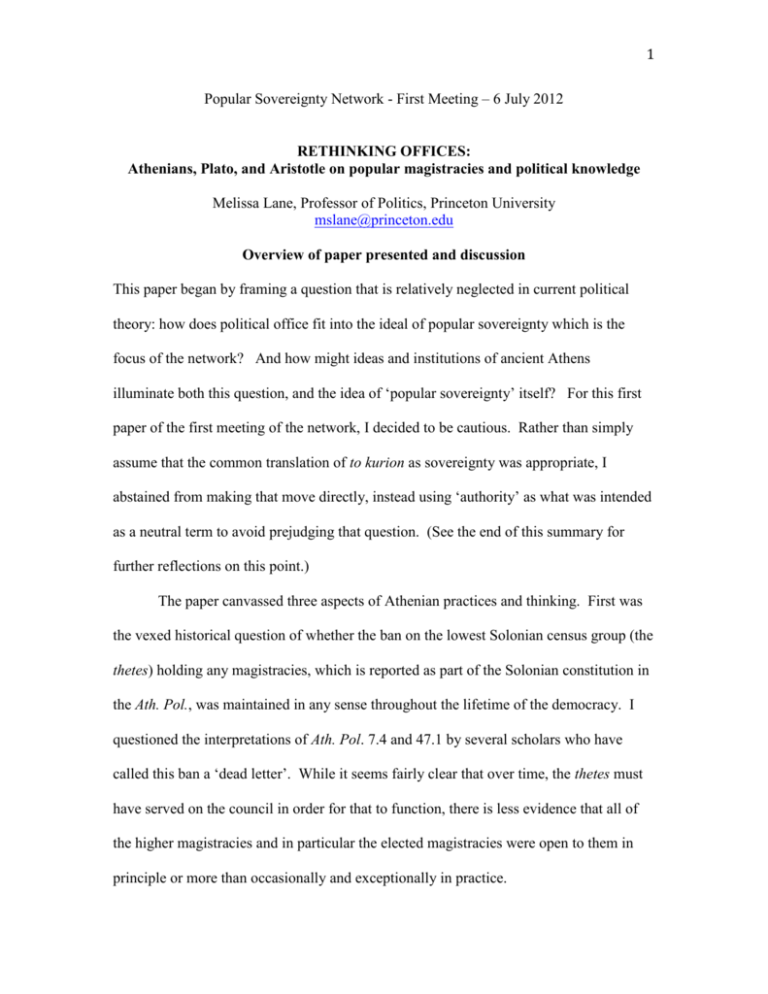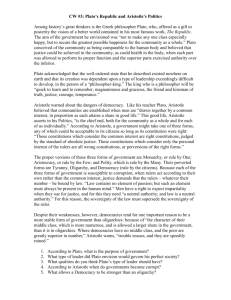Popular Sovereignty Network - First Meeting – 6 July 2012
advertisement

1 Popular Sovereignty Network - First Meeting – 6 July 2012 RETHINKING OFFICES: Athenians, Plato, and Aristotle on popular magistracies and political knowledge Melissa Lane, Professor of Politics, Princeton University mslane@princeton.edu Overview of paper presented and discussion This paper began by framing a question that is relatively neglected in current political theory: how does political office fit into the ideal of popular sovereignty which is the focus of the network? And how might ideas and institutions of ancient Athens illuminate both this question, and the idea of ‘popular sovereignty’ itself? For this first paper of the first meeting of the network, I decided to be cautious. Rather than simply assume that the common translation of to kurion as sovereignty was appropriate, I abstained from making that move directly, instead using ‘authority’ as what was intended as a neutral term to avoid prejudging that question. (See the end of this summary for further reflections on this point.) The paper canvassed three aspects of Athenian practices and thinking. First was the vexed historical question of whether the ban on the lowest Solonian census group (the thetes) holding any magistracies, which is reported as part of the Solonian constitution in the Ath. Pol., was maintained in any sense throughout the lifetime of the democracy. I questioned the interpretations of Ath. Pol. 7.4 and 47.1 by several scholars who have called this ban a ‘dead letter’. While it seems fairly clear that over time, the thetes must have served on the council in order for that to function, there is less evidence that all of the higher magistracies and in particular the elected magistracies were open to them in principle or more than occasionally and exceptionally in practice. 2 Whatever the resolution of this historical debate, my interest in the second part of the paper was in Aristotle’s take on it, and in particular, on his endorsement of what I call the Solonic solution in Politics III.11: that the thetes should elect and inspect magistrates – functions that they carried out as assemblymen and jurors -- but not hold any of the individually chosen magistracies themselves. To make this distinction, Aristotle had to invent the categories of definite and indefinite office, and then to explain in what way the holders of indefinite offices could be kurios – indeed, at one point, kuriotaton – over the holders of the actual archai who would normally be assumed to be supremely politically powerful. Aristotle deploys the category of to kurion to explain in what way the demos who do not hold magistracies themselves can nevertheless exercise power and rule: through election and inspection of those who do hold the archai. My focus on election here (which some in the audience, including Keith Sutherland, questioned) is Aristotle’s focus: his interest in these chapters of the Politics, I argued, is precisely in the relation of the many to the holders of the select archai which are elected (in the archairesia meetings of the assembly), and not in giving a broader theory of all of the functions that the people carried out in Athens including the roles allotted by sortition. Yet Aristotle’s narrow focus in this chapter is in giving a theory of democracy in relation to the higher magistracies, one which evinces significant continuities with the focus on mechanisms of election and scrutiny in Rome, into medieval and Renaissance cities, and even into the eighteenth and early nineteenth theories of democracy, as participants at the meeting including Valentina Arena, Serena Ferente, and Joanna Innes respectively brought out. Finally, the last part of the paper considered Plato’s grappling with the relation between archein and archai in his Statesman. That dialogue, I argued, develops a 3 systematic distinction between these two etymologically close notions, such that archein is reserved as the activity of the true statesman himself, but is exercised in relation to the specific forms of expertise to be wielded by properly configured and qualified holders of archai – in particular, as generals, orators, and jurisprudes. If Plato refashions archein to be ideally wielded by the statesman in a top down manner distinct from the exercise of the magistracies (archai), Aristotle will fashion to kurion to make clear how the people can exercise rule and power despite not holding (as he thinks they ideally should not) the highest (elective) magistracies. In the course of the discussion, I became inclined to think (though against some opposition, and open to the further discussions of the network) that ‘sovereignty’ may indeed be the best translation of to kurion in Aristotle – as correlative to dominium in Latin – without requiring that such a translation be freighted by post-Bodinian theories of sovereignty.





